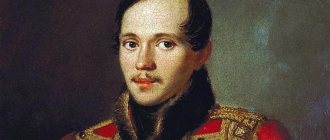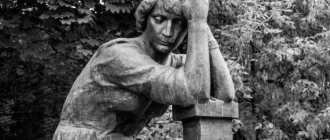Essay on the theme “Motherland” by Lermontov
Option 1
Lermontov's work is unusually original. The line separating Pushkin and Lermontov is December 14, 1825. Lermontov entered literature when revolutionary hopes were dispelled. Hence the originality of his lyrics - desolation, loneliness, premonition of tragic death. However, faith in the people, in their powerful forces, largely helped the poet overcome these moods, and the theme of the poet and poetry, the theme of the homeland, nature, became established in his lyrics.
Patriotic lyrics occupy an important place in Lermontov's poetry.
In 1830, the poet wrote “Borodin’s Field”, on the same topic as the later “Borodino”. This poem is the first embodiment of the thoughts and feelings living in the soul of the patriotic poet. Created in 1837 by Lermontov, who had reached political maturity, “Borodino” became one of the poet’s favorite poems. The poem is written in the form of a conversation between a young soldier and a veteran - a participant in the War of 1812. Essentially, “Borodino” is the story of an ordinary soldier about the Battle of Borodino - only the first 7 lines belong to his young interlocutor. The true patriotism of the Russian people, without posturing, without boasting, is reflected in this poem. The mood of Russian soldiers before the battle is shown in four expressive lines:
The old people grumbled:
“What are we? for winter apartments?
Don't the commanders dare?
Aliens tear up their uniforms
Oh Russian bayonets?
The image of the colonel is surrounded by an aura of high heroism. In his mouth are words that were repeated so many times by Soviet soldiers in 1941:
"Guys! Isn't Moscow behind us?
We'll die near Moscow,
How our brothers died!”
Many of Lermontov’s poems have become a new phenomenon in Russian poetry, because they contain civil indignation and protest against the Nikolaev reality around him, which is destroying the most talented people. The poem “The Death of a Poet” is dedicated to the tragic death of Pushkin, who fell in an unequal struggle with the world, with high-ranking officials who destroyed “his free, bold gift.”
One of the best examples of Lermontov’s patriotic lyrics is the poem “Motherland”. Its theme is determined by the name itself: “Motherland”. This is no longer the Russia of the “blue uniforms,” but the country of the Russian people, the fatherland of the poet. The poet calls his love “strange”:
I love my fatherland, but with a strange love!
This love is not like the official patriotism of the ruling classes. It is composed of the poet’s ardent love for the Russian people and love for his native nature. The poem recreates magnificent pictures of nature: the cold silence of the steppes, “boundless swaying forests,” “sea-like” river floods. The native nature is majestic.
Next, the poet’s thought turns to the people: “I like to ride in a cart along a country road.” “The Country Road” leads us to the village, and a picture of the life of Russian people appears, a touching, sad image of the Russian village:
And, with a slow gaze piercing the shadow of the night,
Meet on the sides, sighing for an overnight stay,
Trembling lights of sad villages.
The life of the common people is close and understandable to the poet; everything connected with the life of the Russian peasant is dear:
With joy unknown to many
I see a complete threshing floor
A hut covered with straw
Window with carved shutters.
The people appear before the gaze of the lyrical hero on weekdays and on holidays:
And on a holiday, on a dewy evening,
Ready to watch until midnight
To the dance
Option 2
The work of Mikhail Yuryevich Lermontov is permeated with love for the Motherland. He loved the Russian people infinitely and subtly felt the beauty of his native nature. It is not surprising that landscape sketches are an integral part of his lyrical and prose works. What is the love of the lyrical hero of Lermontov’s poems dedicated to the Motherland? This love is expressed in the fact that the poet loves, first of all, his native nature, his people, but hates the autocracy, feudal Russia.
Many of Mikhail Yuryevich Lermontov’s poems are dedicated to the Motherland, as well as to protest against autocracy. In them, he conveys the strangeness of his lyrical hero’s love for Russia, thereby the poet contrasts his patriotism, real and genuine, with patriotism, official and official. Mikhail Yuryevich glorified his native Russian nature with all his creativity. In many works the poet depicted beautiful pictures of nature. In the poem “Motherland,” Lermontov glorifies people’s Russia, which he loves directly, heartily. The steppes, boundless forests and rivers are dear and dear to him. In “Motherland,” specific signs of a rural landscape appear with traces of peasant labor and life. His lyrical hero talks about the pros and cons of Russia, but, despite all the disadvantages of his country, he loves it. That is why Lermontov calls this love strange.
The strangeness lies in the poet’s own ambivalent attitude towards the Motherland. A sharp contrast is the lines of the poem “Farewell, Unwashed Russia”, condemning the autocratic serfdom society of Russia. This work very sharply and sharply conveys dissatisfaction with the authorities. In his poetry, always sincere, passionate and excited, Lermontov rejects the foundations of feudal Russia that have developed over centuries and wants to see the Russian people free and enlightened. He rebels against political oppression, against inactivity and passionately calls on his contemporaries to fight for freedom, for the happiness of people. The writing of “Farewell, Unwashed Russia” was inspired by the poet’s exile to the Caucasus for the equally harsh poem “The Death of a Poet.”
A different mood is contained in the poem “Caucasus”. Since childhood, Lermontov visited the Caucasus. He was inspired by the nature of southern Russia, he painted landscapes of mountains, the sea, and described majestic natural phenomena. Later, Mikhail Yuryevich arrived here during his exile. “Caucasus” shows the poet’s incredible love for natural beauty. The lyrical hero talks about what thoughts and feelings nature evokes. The Caucasus calms the poet, pacifies his spiritual anxieties. Thus, all the works of Mikhail Yuryevich Lermontov are opposed to each other.
They express different emotions: love and hate; the opposite attitudes of the lyrical hero towards Russia: admiration for nature and rejection of official patriotism. This is the strangeness of the poet’s love for the Motherland. Lermontov's poetry is the poetry of deep thought, civic duty and thirst for life. His poems are warmed by a feeling of great love for the people.
The theme of the Motherland in the works of M. Yu. Lermontov
The theme of the Motherland and patriotic motives in the works of Lermontov sound somewhat different than in the works of other poets of the 19th century.
This is explained not only by the personality traits, character of Lermontov or his ideological position, but also by the socio-political situation in the country. In the conditions of the most severe reaction after the massacre of the Decembrists, many public figures lost faith in themselves and saw no point in following the path of honest and courageous fighters for freedom and reforms in Russia. A period of apathy, inactivity, and passivity of the younger generation began, which was an alarming symptom for the political movement. In Lermontov's poems, the reader feels tension, gloom, and some gloominess of the author, although protest sentiments are present in the poet's lyrics, despite the oppressive atmosphere of modern reality. Thus, in the poem “Motherland,” the poet talks about the duality of feelings that he experiences when thinking about nature, people and the country as a whole. He admits: “I love my fatherland, but with a strange love!”
And this “strangeness” lies in the fact that the poet does not love the glory of Russia and not its history (“treasured legends of dark antiquity”), not power and not the autocratic serfdom state. Moreover, everything that does not evoke tenderness in his soul is directly opposite to other pictures of Russian reality, at the sight of which warm feelings arise in the poet’s heart. These are landscapes of central Russia with its country roads, birch trees, peasant huts:
I love the smoke of burnt stubble, a convoy train spending the night in the steppe.
Those steppe expanses, which for many people are associated with a melancholy mood, Lermontov really likes and evokes pride at the sight of the greatness of the Motherland:
But I love - for what, I don’t know myself - Her cold silence of the steppes.
It is also surprising that the nobleman Lermontov enjoys watching “the dance with stomping and whistling,” which means he appreciates national, folk traditions and culture. Having never held a plow in his hands, he, “with a joy unfamiliar to many,” notes the success of peasant labor: “a full threshing floor” as a result of a harvest year, that is, there is quite a lot of grain for those grain growers who are lucky enough not to go bankrupt. Passing through villages, the author manages to note some cozy houses and admires the huts of those village craftsmen who decorated the windows of their houses with carved shutters.
Love for peasant Russia, however, does not blind the poet to the negative aspects of Russian life: the lack of rights and oppression of the people, the arbitrariness of the gendarmes. He experienced the surveillance of a secret police department, censorship, and persecution of his creativity. All this weighed heavily on many freedom-loving people, and as a result, Lermontov appeared in such harsh lines, which were written before his new forced departure to the Caucasus:
Farewell, unwashed Russia, Country of slaves, country of masters, And you, blue uniforms, And you, people devoted to them.
Of course, the “unwashed Russia” metaphor should not be taken literally. Here, probably, one can see not only the author’s irritation in connection with the miserable existence and poverty of the population, but also indignation at the lack of culture, that is, the darkness of the consciousness of the illiterate peasantry, who see no point in fighting for their own rights.
These poems were created by the poet in 1841, shortly before his death, when Lermontov’s pessimistic moods intensified due to life circumstances.
And in 1837, the theme of the Motherland sounded very bright and patriotic in the poem “Borodino”. At that time, the poet wrote about a historical event in Russian history with great pride. The “combat fights” during the Battle of Borodino are remembered by the entire Russian people, since it was then that the outcome of the struggle in the Patriotic War of 1812 was decided. Lermontov admires the love of ordinary soldiers for the Motherland; he writes about this with pathetic intonations:
And we promised to die, And we kept the oath of allegiance in the Battle of Borodino.
The poet agrees with the narrator, an old soldier who answers the questions of a young warrior, that the participants in those battles should be considered not only great patriots, but also heroes of the Russian land. Among them are both simple peasants and noble nobles:
Our colonel was born with a grip: Servant to the king, father to the soldiers.
Russia was proud of such commanders, because people believed in them, they led their troops, setting a personal example:
Guys! Isn't Moscow behind us? We will die near Moscow, just like our brothers died.
Thanks to the dedication, bravery and courage of the war participants in the fight against Napoleonic army, Russia defended its independence, when not only guns decided the outcome of the battle, but also “daring, hand-to-hand” combat. That’s why you can be proud of people who are ready to give their lives for the sake of their Motherland, and Lermontov rightfully calls them a powerful, dashing tribe, heroes.
Poems dedicated to the nature of their native land can also tell a lot about the poet’s love for the Motherland. Sometimes for a suffering person, communication with nature is like a balm for the soul. In the tone of the poem “When the yellowing field is agitated. “One senses a desire to escape from the oppressive reality to freedom, to nature. Lermontov wrote this landscape miniature while under surveillance (as a result of persecution for the poem “The Death of a Poet”). But he found a way out: he was able to imagine himself free, as if he found himself in the lap of nature, although everything happened in his imagination. And the pictures he painted not only breathe love for his native land, but also speak of a person’s ability to feel spiritual fusion with the world around him.
Patriotic feelings can be expressed in different ways: either with the bitterness of a person who knows about the vices in his Fatherland, or with the greatest tenderness of a loving son for his motherland. In the works of M.Yu. Lermontov, many shades of feelings in relation to nature and the Motherland appeared, and all his poems bring readers a feeling of involvement in the problems posed and in thoughts about the need for changes in society.
Lermontov's attitude to the Motherland (essay)
Beautiful in its form and deep in its meaning, the poetry of Mikhail Yuryevich Lermontov does not cease to excite readers even one hundred and sixty years after his birth. We all know that you don’t choose your homeland. Lermontov teaches us to show love for Russia, its vast expanses, squalor and wealth. Mikhail Yuryevich is able to see the beauty of magical magnitude in an ordinary landscape, to penetrate into the very meaning of existence. His patriotism is not ostentatious, leafy, but heartfelt, flowing directly from the depths of his soul, sometimes “giving off a certain bitterness.”
Lermontov's ambivalent feelings for his homeland are evident in almost every line of his novels. This is “abundant and wretched” Russia - his most beloved homeland, but at times anger and pain break out at the long-suffering of people, the humility of slaves, which Mikhail Yuryevich does not want and cannot understand, accept, or explain. The forced exile to the Caucasus is perceived by Lermontov as a blessing, because the poet simply hates the general suspicion, the attention of the authorities towards him, as well as the apathy towards such an “order”.
PATRIOTISM IN THE POETRY OF M. YU. LERMONTOV
Mikhail Yurievich Lermontov was born two years after World War II
1812. The poet's work developed after the defeat of the Decembrist uprising. Paying tribute to the feat of the Russian people, Lermontov writes his famous “Borodino”. This poem became a kind of hymn to the heroic soldiers who gave their lives for their homeland. Reading the poem, we see such vivid pictures of the battle as if we ourselves were on the battlefield. Later, Lev Nikolaevich Tolstoy would say that without this poem there would have been no “War and Peace.”
Lermontov protests against thoughtless and aimless life; his works are varied and deep in their internal content. Lermontov was a patriot, and this motif runs through many of his poems.
As a patriot, Lermontov protests against the evil generated by the tyrant-autocrat, calls for a fight against man's violence against man, and becomes an inspirer of people's hopes.
Nicholas I, frightened by the Decembrist uprising, turned Russia into a prison for freedom-loving people. All literary works of that time were subject to the most severe censorship, culture and education were persecuted.
But even under these conditions, Lermontov remained true to his ideals. He exposes and exposes serfdom and political oppression, tyranny of power and national prejudices. Lermontov opposes the privileges of the nobility, against the enslavement of man by gold, and defends the democratic idea of equality. From the first political poems to mature creativity there is one increasingly deepening line of rupture between the poet and “official” Russia.
It took great courage to write the poem “The Death of a Poet” under these conditions. It was written hot on the heels of events and under the direct impression of them. Although we are talking about a specific person and his fate, there are many generalizing images here. “Freedom, Genius and Glory are the executioners,” the poet calls the noble-serf society and its ruling clique.
Lermontov absorbed and expressed with “terrible power” the deepest quests of the era. He is looking for a way out of the current situation; the poems contain notes of struggle: “And he, the rebellious one, asks for a storm...”
Many of Lermontov's poems embodied the spirit of action, daring; a warm heart beats in his poems. “So life is boring when there is no struggle” - this line can serve as the motto of the poet’s entire creative career. The poet yearned for heroic deeds, called for struggle, awakened his contemporaries from cowardly slumber, and kindled the hearts of like-minded people.
Lermontov was not satisfied with the aimless life in noble society, it burdened him: “And life, as you look around with cold attention, is such an empty and stupid joke... The poet strives with all his might to throw off the shackles. The liberating pathos of his poems stands next to the patriotic one.
By 1841, Lermontov's patriotic poetry reached its peak. “Motherland”, “I go out alone on the road...”, “Farewell unwashed Russia...” - this is an incomplete list of poems from this period.
Lermontov's Russia is a multifaceted and contradictory country: abundant and poor, destitute in the present and living with hope for the future. But still the poet loves her. Now, next to bitterness and disappointment, simplicity and sincerity appear. This is already a “new”, “unexpected” Lermontov, imbued with sad love for man. His poems are very lyrical:
...But I love - for what, I don’t know myself -
Its steppes are coldly silent,
Her boundless forests sway,
The floods of its rivers are like seas...
In longing for the greatness and beauty of life, the poet draws wonderful images of a “fantastic” world. But there are ways by which the poet gains support in real life: this is a feat in the name of his homeland.
In Lermontov's poetry, during the period of his highest creative passion, the heroic idea is intertwined with the patriotic one, patriotism with the idea of the people. That is why he turns to the unforgettable date of 1812 with such ardent reverence and writes heartfelt lines about Moscow.
Every thought of Lermontov stirs souls even now. This is a man who raised his voice in defense of freedom and equality during the years of reaction and thereby showed himself not only to be a patriot, but also a courageous and courageous person. The poet remained faithful to his chosen theme until the end of his life, fighting for personal freedom and the freedom of his homeland.
Patriotic motives in the lyrics of M. Yu. Lermontov
For Lermontov, homeland is a broad and multifaceted concept. His attitude towards Russia is imbued with pain and pride for its fate.
Lermontov’s early lyrics contain civic motives of rejection of slavery (“Complaints of a Turk”), glorification of a revolutionary feat (“July 10, 1830”), exaltation of the former power of Russia (“Novgorod”, “I greet you, warlike Slavs...”). Lermontov connects social problems with some deep, historical processes.
In the poem “Monologue,” the poet comes to an unexpected and tragic conclusion - the Motherland itself condemns its children to inaction, to miserable vegetation, to the death of talents:
Believe me, insignificance is a blessing in this world...
Why deep knowledge, thirst for glory,
When can we not use them?
And it seems stuffy in the homeland,
And the heart is heavy, and the soul is sad...
That is why the motif of contrasting modern, flawed existence with the former power of free Russia is so strong in Lermontov’s lyrics. Lermontov finds one of the highest manifestations of the power of the Russian spirit in the recent past: in the War of 1812. Lermontov perceives Russia's victory over Napoleon as a symbol of the triumph of justice and the enormous spiritual strength of the nation. The poem “Borodino” contrasts the “present time” and the time of the “epic” heroes:
Yes, there were people in our time
Not like the current tribe:
The heroes are not you!
The modern generation is incapable of heroic deeds and has lost its spiritual connection with the people. The old soldier speaks on behalf of the past generation in the poem: he speaks on his own behalf and on behalf of all the defenders of the Fatherland. It is no coincidence that the pronoun “we” is constantly heard in the poem - this is how Lermontov conveys the most important property of Russian national psychology: the personality does not exist on its own, but in fusion with others. But this does not depersonalize a person. It was the Russian soldiers who brought victory to Russia:
What is there to be cunning about, perhaps for a fight;
We'll go and break the wall,
Let's stand with our heads
For your homeland!
Soldiers go into battle for their homeland, obeying the moral law: “How our brothers died!” They remember their fallen commander with love:
Our colonel was born with a grip:
Servant to the king, father to the soldiers...
These natural relationships are opposed to the immoral laws by which the “current tribe” lives.
In 1841, two poems were written in which Lermontov most fully and deeply reveals all the inconsistency and complexity of his attitude towards the Motherland:
Goodbye, unwashed Russia,
Country of slaves, country of masters...
For the first time in Russian literature, there was a condemnation not of any individual aspects of Russian reality, but of all of Nicholas Russia:
And you, blue uniforms,
And you, their devoted people.
We are talking about both the misfortune and the guilt of Russia and its people. The poem expresses a feeling of hopelessness: it is impossible to live in this country of obedience, cruelty and lack of freedom.
In the poem “Motherland,” Lermontov calls his attitude towards the Motherland “strange love.” The poem is built on the opposition of “official patriotism” and natural human feeling. Pictures of true Russia in no way deny Russia as a state in Lermontov’s mind.
Lermontov’s complex attitude towards the Motherland, his acceptance of it with his soul and not his mind, his refusal to explain why a person loves his homeland, laid the foundation for a whole tradition in Russian poetry:
You can’t understand Russia with your mind...
You can only believe in Russia.
(F.I. Tyutchev)
The originality of the patriotic theme in the lyrics of M.Yu. Lermontov literatura5.narod.ru. - presentation
The originality of the patriotic theme in the lyrics of M.Yu. Lermontov literatura5.narod.ru
The originality of the patriotic theme in the lyrics of M.Yu. Lermontov For a literature lesson in the 9th grade. Can also be used in literature lessons in 10th grade at the beginning of the school year.
Note: The presentation is built on a linear principle. But you can use hyperlinks: – go to the page with the text of the work – go back – note
“He is a Russian poet at heart - the past and present of Russian life lives in him.” V.G. Belinsky
Lermontov's patriotism (features associated with the character of the era) 30s of the 19th century: “patriotism” Orthodoxy autocracy nationality In Lermontov’s lyrics, a true feeling of love for the fatherland is contrasted with “official patriotism” In 1841, 2 poems were written in which Lermontov most fully revealed the inconsistency, the complexity of one’s attitude towards the Motherland: “Farewell, unwashed Russia...” and “Motherland”
The theme of the Motherland runs through all of Lermontov’s work. In his early work, a love for his native nature is manifested. Singing it, the poet speaks with sympathy about the common people. Thoughts about the homeland - thoughts about freedom: ...The steppe spreads out like a purple veil, And it is so fresh, and so close to the soul, As if it was created only for freedom. (“You are beautiful, fields of your native land”) Already in his youthful poems, Lermontov painted pictures of rural, peasant Russia. He recalls wide villages in the morning haze, “heaps of small huts”, “the balalaika sound of the people” (“The Sun”, “Romance”, “Two Brothers”).
Farewell, unwashed Russia, Country of slaves, country of masters, And you, blue uniforms, And you, people devoted to them. Perhaps, behind the wall of the Caucasus I will hide from your pashas, from their all-seeing eyes, from their all-hearing ears. These words contain not only condemnation, but also pain at the thought that the people are dark, unenlightened, that their slave position has developed in them the habit of submitting to force. The poet considers the most terrible situation in Russia to be that “a huge number of people suffer patiently, while others suffer without realizing it” (from a conversation with the Slavophile Yu. T. Samarin).
Farewell, unwashed Russia, Country of slaves, country of masters, And you, blue uniforms, And you, people devoted to them. Perhaps, behind the wall of the Caucasus I will hide from your pashas, from their all-seeing eyes, from their all-hearing ears. It is not accusation that is heard here, but pain and annoyance. (Pushkin has this pain in “The Desert Sower of Freedom...”) In the poem, the poet never said the word “homeland.” “Desolate sower of freedom...”) The poet, without regret, says goodbye to “official” Russia - a dungeon where not a single person feels free and everyone can be subjected to police surveillance. Nicholas Russia is “a country of slaves, a country of masters.” She does not evoke the poet’s love and sympathy.
Denying the official Nikolaev Russia, the poet turns his gaze to another fatherland: I love the fatherland, but with a strange love... “Russia has no past: it is all in the present and future” (the last of the entries in Lermontov’s notebook) But the present of Russia did not satisfy the poet, but hopes for the future were connected with people's Russia, and he addresses it in the poem. Such love must have seemed strange at a time when official patriotism was proclaimed, and most of the nobles were far from the people.
I love my fatherland, but with a strange love! My reason will not defeat her. Neither glory bought with blood, nor peace full of proud trust, nor cherished legends of dark antiquity stir joyful dreams in me. There is no hint in the poem of glorifying obedience and the Christian faith: it denies the military glory that, according to official historians, is owed to kings and generals. denies the "peace" achieved as a result of victorious campaigns. denies the “dark antiquity” as a positive ideal for Russia.
I love my fatherland, but with a strange love! My reason will not defeat her. Neither glory bought with blood, nor peace full of proud trust, nor cherished legends of dark antiquity stir joyful dreams in me. The poet fills these concepts with his own special meaning. The choice of words, figurative means, and intonation speak of love: “peace full of proud trust,” “cherished legends.” The verse sounds solemn and measured, but everything that Lermontov writes about here was in the past. And the poet’s thoughts are occupied with the future of Russia.
When the poet thinks about the future, his hopes and “joyful dreams” are connected not with wars and the “proud peace” of the state, but with the people. The poet paints pictures dear to the heart of every Russian person and talks about love for his native nature and simple rural life: But I love - why don’t I know? - Its steppes are coldly silent, Her boundless forests are swaying, The floods of its rivers are like seas... On a country road I love to ride in a cart, And, with my slow gaze piercing the shadows of the night, To meet on the sides, sighing for an overnight stay, The trembling lights of sad villages... Before the reader’s mind’s eye appears Central Russian landscape, with forests that give way to steppes, wide rivers, country roads...
But I love - why don’t I know? - Its steppes are coldly silent, Her boundless forests are swaying, The floods of its rivers are like seas... I love to ride on a country road in a cart, And, with my slow gaze piercing the shadows of the night, To meet on the sides, sighing for an overnight stay, The trembling lights of sad villages... Before us is not a fleeting sketch , capturing a moment in the life of nature, and the poet’s favorite paintings gradually appearing before him. We see exactly what makes him believe: “Russia is all... in the future.”
Love for people's Russia is expressed in “Motherland” simply and deeply, without pompous exclamations or pathos. The poem is characterized by an almost complete absence of metaphor, which is common in many of Lermontov’s works. N.A. Dobrolyubov: “...an amazing poem “Motherland”, in which he rises above all the prejudices of patriotism and understands love for the Fatherland truly, sacredly and rationally... The fullest expression of pure love for the people, the most humane view of life cannot be demanded from a Russian poet” (Article “On the degree of participation of the people in the development of Russian literature”, 1858.)
Three leaving the village. Drawing by M. Yu. Lermontov. Pencil – Many of M.Yu. Lermontov’s drawings depicted “country” rural Russia.
Landscape with two birches. Watercolor by M. Yu. Lermontov. 1828–1832. Many of M.Yu. Lermontov’s drawings depicted “country” rural Russia.
Landscape with a mill and a galloping troika. Watercolor by M.Yu.Lermontov
“With a joy unfamiliar to many,” Lermontov captured in this landscape the signs of his beloved homeland: a mill, a narrow river, a troika galloping along a country road, “a pair of white birches” on a hill, distances covered with a bluish haze.
List of printed sources used: 1.Res Z.Ya.M.Yu.Lermontov at school. – L.: Uchpedgiz, 1963, p. 110 – Lermontov Encyclopedia / USSR Academy of Sciences. Institute rus. lit. (Pushkin. House); Scientific-ed. Council of the publishing house "Sov. Encycl." – M.: Sov. Encyclopedia, Source of illustrations: Lermontov Encyclopedia / USSR Academy of Sciences. Institute rus. lit. (Pushkin. House); Scientific-ed. Council of the publishing house "Sov. Encycl." – M.: Sov. Encycl., 1981: slides 3–4 (M. Yu. Lermontov in a frock coat of the Tengin Infantry Regiment. Watercolor by K. A. Gorbunov – insert between pp. 528 – 529); slides 15, 16, 17, 18 (tab between pages 144 – 145). slides 3–4
Notes: Slide 4. “According to Belinsky, Lermontov’s poems contain “all the forces and all the elements that make up life and poetry.” Lermontov with his poems answers the questions of life, the painful questions of our time; “He is a Russian poet at heart - the past and present of Russian life lives in him.” (Source: Gershenzon D. Ya. Lermontov in Russian criticism // Life and creativity of M. Yu. Lermontov: Research and materials: Collection one. - M.: OGIZ; State publishing house of artistic literature, 1941, p. 596.)
Notes: Slide 7. From the diary of Yu. F. Samarin for 1841. Works, vol. XII, pp. 56 – 57. His [Lermontov’s] opinion about the current state of Russia: “The worst thing is not that a certain number of people are patiently suffering , but the fact that a huge number suffer without realizing it.” (Source: Shchegolev P. E. Book about Lermontov: [In 2 books]. – L.: Priboy. Issue 2. – 1929, p. 162.
Notes: Slide 9. In a letter to G. Herweg, Herzen about the main idea from the poet’s rough sketch: “Russia has no past: it is all in the present and future...”, which was posthumously published in “Notes of the Fatherland” (1844, vol. XXXII ). In Lermontov’s notebook, this sketch dates from April – July 1841 (Source: Gillelson M. Lermontov in Herzen’s assessment // Works of M. Yu. Lermontov: 150 years since his birth, 1814–1964. – M.: Nauka, 1964 , page 378.)
Notes: Slide 14. N. A. Dobrolyubov in the article “On the degree of participation of the people in the development of Russian literature” (1858) about, in which he ... understands love for the fatherland truly, sacredly and wisely” (Collected works, vol. 2 , 1962, p. 263). (Source: Manuilov V. A. “Motherland” // Lermontov Encyclopedia / USSR Academy of Sciences. Institute of Russian Literature (Pushkin House); Scientific-editorial council of the publishing house “Soviet Encyclopedia” - M. : Sov. Encycl., – pp. 469–470.
(1831)
A.S. Pushkin *** From here came the sower to sow his seeds of Freedom, the deserted sower, I went out early, to the star; With a pure and innocent hand I threw a life-giving seed into the enslaved reins - But I only lost time, Good thoughts and works... Graze, peaceful peoples! The cry of honor will not wake you up. Why do the herds need the gifts of freedom? They should be cut or trimmed. Their inheritance from generation to generation is a yoke with rattles and a whip. (1823) Pushkin writes with bitterness that the enslaved people are accustomed to the yoke and whip, that they still remain deaf to the voices demanding freedom for themselves. Pushkin, even more sharply than Lermontov, speaks of the “obedient people” as a herd that does not know how to appreciate the “gifts of freedom.”
The originality of the patriotic theme in the lyrics of M.Yu. Lermontov literatura5.narod.ru





